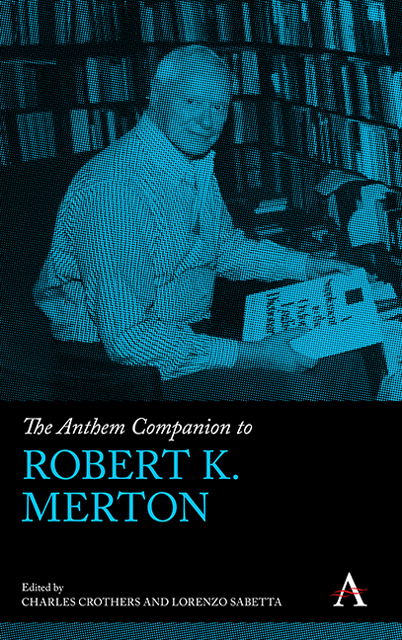Book contents
- Frontmatter
- Dedication
- Contents
- List of Figures and Tables
- Chapter One Introduction: Merton’s Self-Exemplifying Classical Sociological Contributions
- Chapter Two Skeptical Faith, Left Politics, and the Making of Young Robert K. Merton
- Chapter Three Theorist’s Progress: Young Robert K. Merton, 1941–1949
- Chapter Four Taking a Seminar with Merton
- Chapter Five The Development of Mertonian Status-and-Role Theory
- Chapter Six Theory as an Option or Theory as a Must? The Bearing of Methodological Choices on the Role of Sociological Theory
- Chapter Seven “Interviews of a Special Type”: Robert K. Merton and Codification of the Focused Interview
- Chapter Eight Science as a Culture
- Chapter Nine “Providing Puzzles”: Science as Norms and Values
- Chapter Ten A Mertonian Breviary for Cultural Sociologists
- Chapter Eleven The Unpublished Robert K Merton
- Author Biographies
- Index
Chapter Five - The Development of Mertonian Status-and-Role Theory
Published online by Cambridge University Press: 10 January 2023
- Frontmatter
- Dedication
- Contents
- List of Figures and Tables
- Chapter One Introduction: Merton’s Self-Exemplifying Classical Sociological Contributions
- Chapter Two Skeptical Faith, Left Politics, and the Making of Young Robert K. Merton
- Chapter Three Theorist’s Progress: Young Robert K. Merton, 1941–1949
- Chapter Four Taking a Seminar with Merton
- Chapter Five The Development of Mertonian Status-and-Role Theory
- Chapter Six Theory as an Option or Theory as a Must? The Bearing of Methodological Choices on the Role of Sociological Theory
- Chapter Seven “Interviews of a Special Type”: Robert K. Merton and Codification of the Focused Interview
- Chapter Eight Science as a Culture
- Chapter Nine “Providing Puzzles”: Science as Norms and Values
- Chapter Ten A Mertonian Breviary for Cultural Sociologists
- Chapter Eleven The Unpublished Robert K Merton
- Author Biographies
- Index
Summary
The idea of “role” is one of those domesticated concepts that rarely call attention to themselves, but are constantly to be found in the background when you look for them. Role is part of the furniture in the social sciences. Just how much it is taken for granted can be seen in the common response to proffered criticism: surprise, even astonishment, as to why anyone should raise doubts, or what offence could possibly be taken at so helpful and so obvious an idea. No doubt, this is why the penetrating criticisms of role theory that appeared in the first half of the [1970s] decade have failed either to provoke a theoretical debate, or to dampen the flow of role literature in the journals and applied textbooks. Practitioners, it seems, do not take criticism seriously. To them the concept of role is practically unquestionable. Yet it is questionable, very. (Connell 1979)
Introduction: Setting up the Paradox
Role and cognate terms point to fundamental building blocks of social structure, enacted by people and used as descriptive and analytical tools by sociologists. Shakespeare provides a good introductory example with his famous comment that “all the world's a stage” and his status-sequence of the seven ages of man.
Through the several post–World War II (WWII) decades, broadly yoked to the development of “structural functionalism” (or functional analysis), a structural analysis was developed which centered on people's statuses and roles, usually referred to generically as “role theory” or “role analysis.” Frameworks for role analysis steadily accumulated and were widely deployed through the sociology community, especially in the USA. It was also a favored vocabulary, at that time, for working through broader theoretical issues, including in Germany debates around “homo sociologicus” (Dahrendorf 1973). It became a standard entry in textbooks, was often used as a central concept in introductory sociology teaching, and was the framework for many sociological investigations and ideological interventions. Alongside the path of the broader structural–functional framework, status-and-role theory has had a similar trajectory—peaking in the 1960s—but has since lost its central place in sociological discourse, albeit still extensively utilized by a wider array of disciplines and various “social engineers” and practitioners.
- Type
- Chapter
- Information
- The Anthem Companion to Robert K. Merton , pp. 89 - 106Publisher: Anthem PressPrint publication year: 2022

